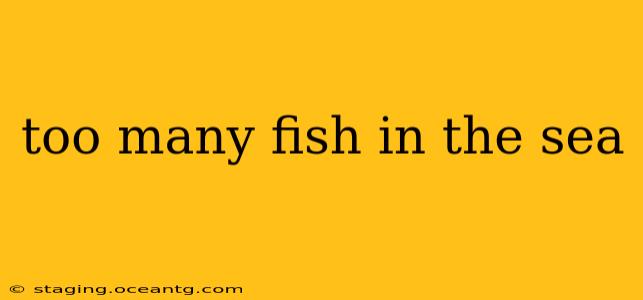Too Many Fish in the Sea: Exploring the Meaning and Its Modern Implications
The idiom "too many fish in the sea" is a common expression used to console someone who has experienced heartbreak or rejection in romantic relationships. It suggests that there are plenty of other potential partners available, implying that the loss of one isn't devastating because there are many more options. But the meaning goes beyond simple consolation; it speaks to abundance, choice, and the evolving landscape of dating and relationships in the modern world.
This seemingly simple phrase raises several interesting questions, often explored in the context of online dating and the changing dynamics of romantic connections. Let's delve into some of these:
What does "too many fish in the sea" really mean?
At its core, the idiom signifies the vastness of potential romantic partners. It’s a reassuring message, suggesting that finding love isn't a limited-resource game. The "sea" represents the large pool of eligible individuals, implying an abundance of possibilities, and diminishing the perceived scarcity of compatible partners. However, this abundance can also be overwhelming, as we'll discuss later.
Is there really too much choice in dating today?
This is a complex question with no easy answer. While dating apps and online platforms have dramatically increased the number of potential partners, they haven't necessarily made finding "the one" easier. The sheer volume of choices can lead to decision paralysis, a phenomenon where the abundance of options makes it difficult to make a decision at all. Additionally, the ease of switching between potential partners can sometimes lead to a lack of commitment and a sense of dissatisfaction, despite the ostensibly vast pool of possibilities.
How does "too many fish in the sea" apply to online dating?
Online dating platforms embody the "sea" in the idiom. Apps like Tinder, Bumble, and Hinge present users with a seemingly endless stream of profiles, making the selection process both exciting and daunting. The ease of swiping and moving on to the next profile can contribute to a culture of instant gratification, potentially diminishing the value placed on individual connections. This abundance, while seemingly advantageous, can also lead to a sense of superficiality and a decrease in genuine connection.
Does the idiom reflect a realistic view of relationships?
The idiom's inherent optimism can be both comforting and misleading. While there are indeed many potential partners, finding a truly compatible and fulfilling relationship remains a challenging task. The idiom simplifies a complex process, overlooking the effort, vulnerability, and genuine connection-building required to form lasting relationships. It can, therefore, be seen as both a helpful reassurance and a somewhat naive oversimplification.
Is the abundance of choice a positive or negative thing in dating?
The abundance of choice in modern dating presents a double-edged sword. On the one hand, it offers increased opportunities to find a compatible partner, potentially leading to greater satisfaction. On the other hand, it can lead to feelings of overwhelm, indecision, and a decreased appreciation for individual connections. The key lies in navigating this abundance thoughtfully and strategically, focusing on building genuine connections rather than simply accumulating options.
In conclusion, while "too many fish in the sea" offers a comforting message of hope and abundance, it's crucial to consider its implications within the context of modern dating. The abundance of choices doesn't automatically translate to ease or greater success in finding love. Cultivating authentic connections, prioritizing meaningful interactions over superficial swiping, and approaching dating with self-awareness and intentionality are key to navigating the complexities of the modern dating landscape, regardless of how many "fish" are available.
